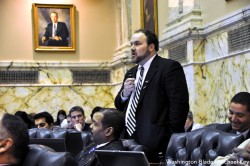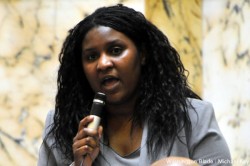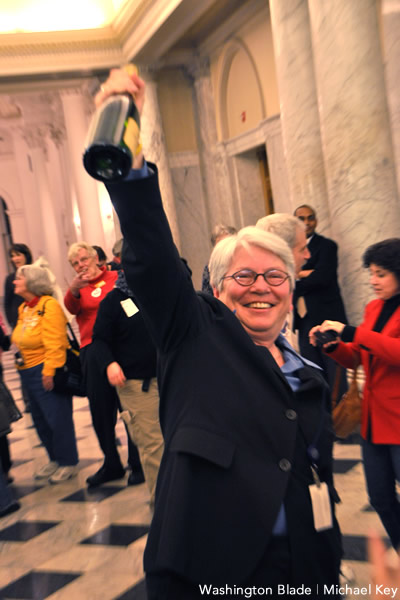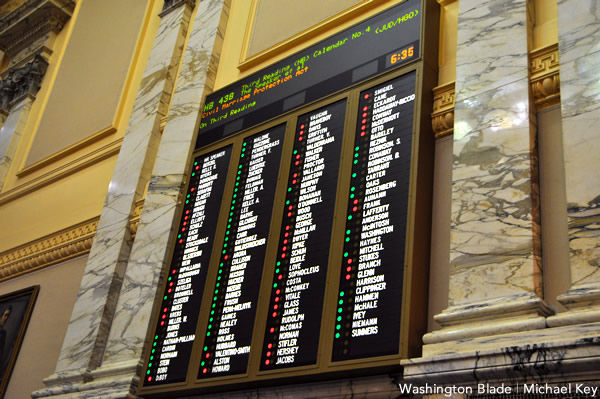Local
Marylanders celebrate as House OKs marriage bill
Intense floor debate leads to dramatic victory; referendum on horizon

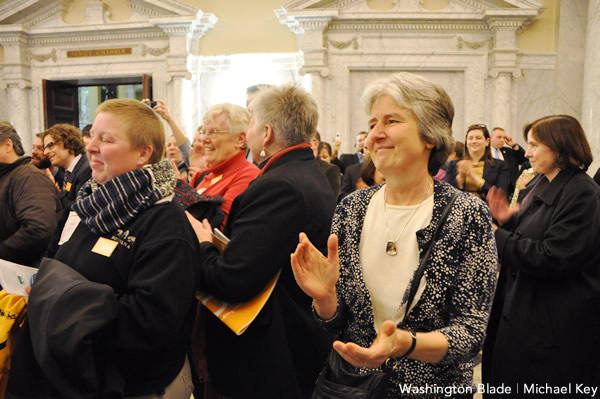
The crowd gathered at the Maryland Capitol cheered ecstatically when the marriage bill passed. (Washington Blade photo by Michael Key)
ANNAPOLIS, Md. — A jubilant crowd erupted into cheers outside the House of Delegates chambers Friday night, as news broke that lawmakers had approved the Civil Marriage Protection Act in a close 72-67 vote.
The dramatic outcome — the bill passed by two votes, triggering a raucous cheer in the chambers — followed an emotional debate over the measure that would extend marriage rights to same-sex couples in the Free State. The bill now goes to the Senate, which passed a similar measure last year, and is expected to vote on the bill in the coming weeks.
MORE PHOTOS AND COVERAGE OF THE DEBATE LEADING UP TO THE WIN FROM THE BLADE.
Gov. Martin O’Malley has made the bill a priority and testified in favor of it at a House committee hearing. Assuming the Senate passes it as expected and O’Malley signs as promised, opponents would have until May 31 to collect 55,736 valid signatures to qualify a measure for the November ballot that would strike down the law.
“I didn’t do anything, we all did it,” Del. Luke Clippinger (D-Baltimore) said after the historic vote. “And now we’re sending this bill to Sen. Madaleno in the Senate, and we believe we’ll get this bill passed, and get it to the governor’s desk, and he’ll sign it right away.”
“As a big baseball fan, I’m guessing this is what it feels like to win the World Series,” Del. Heather Mizeur (D-Takoma Park), a lesbian, told the Blade.
Clippinger became emotional as he rose to encourage his colleagues to support extending marriage rights to himself, the six other openly gay and lesbian delegates in the Maryland House, their colleague Sen. Richard Madaleno, and thousands of same-sex couples throughout Maryland.
“I ask you to vote ‘yes’ because the joy felt by two parents raising children shouldn’t be overshadowed by fear that the other parent might not be able to care for that child in a time of crisis,” Clippinger proclaimed to his fellow legislators. “But more, I’m here tonight to ask you to vote ‘yes,’ as I have before. Because I am here as a child of God, perfect in my imperfections. Because I am here — not less than any other person — but a full beneficiary to all of God’s infinite love, just as each and every person is. Because I am here as a Marylander.”
The final floor speech before the close vote was delivered by Del. Tiffany Alston, who angered many LGBT advocates in 2011 when she pulled her support for the bill. Alston spoke to the delegates about the difficulty she had coming to her decision to once again support gender neutral marriage in Maryland.
“I can say that my religion still tells me that marriage is between a man and a woman,” Alston said in a shaking voice, clearly emotional. “And I can tell you I still believe it’s OK for people of the same sex to get married. But what I know, is that as a state it’s time for us to move beyond this issue.”
“Today, I’m going to cast a green vote in support of the bill.” Alston adding, noting that she supports a referendum on the issue.
Upon her proclamation, many of the gay and lesbian lawmakers — including Clippinger, who had been a driving force behind the bill — became visibly emotional.
Alston offered one of two amendments that was accepted by the legislature earlier in the afternoon, which would ensure that the law could not take effect until all legal challenges to the law and any possible referendum were settled. However, according to the Maryland Constitution, a law cannot take effect until any referendum challenge has been settled in any case, meaning the Alston amendment merely restated existing state law.
Supporters of same-sex marriage were happy to back Alston’s amendment if it meant comfort to those lawmakers hesitant to support the bill before them because they feared a referendum would be blocked.
“It was something that could add a level of comfort for some people,” Del. Mary Washington (D-Baltimore), a lesbian, told the Blade, after the amendment was accepted 81-52. “This is something that we could negotiate on.”
Mizeur told the Blade that the fate of Alston’s vote on the bill itself was in the balance up to the afternoon of the vote. Throughout the proceedings, Alston seemed emotional, often resting her head in her hands as she sat at her desk, and looking around the room at her colleagues as they delivered their speeches for and against the bill.
“We talked about it as a possibility yesterday, and we were putting things in play to see if it would work,” Mizeur said. “By this morning, I was told 50/50, and we didn’t exactly know for sure when we were heading into the floor. It was that close.”
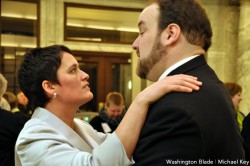
Dels. Heather Mizeur and Luke Clippinger embraced following the vote. (Washington Blade photo by Michael Key)
The bill’s supporters were grateful for Alston’s vote, as her change of heart in March 2011 elicited a backlash from many in the LGBT community.
Another amendment that the delegates passed was a measure that would have changed the date that the law went into effect from October to January.
A rejected amendment would have changed “civil marriage” to “civil unions,” in the law, a change that at least four of those who eventually voted against the bill said would have helped persuade them to support the measure, including former National Football League quarterback, Del. Jay Walker, who cited his fellow former NFL player, gay defensive tackle Esera Tuaolo in his remarks.
Another rejected amendment would have changed the legal age of consent for same-sex marriage to 18, and a fourth would have allowed parents to opt their children out of same-sex marriage related curriculum that they found offensive, which lesbian Del. Anne Kaiser argued the law already allows.
During the floor speeches Friday night, Del. Maggie McIntosh (D-Baltimore) gave a moving speech about making history in 2001 when she came out as a lesbian to her fellow lawmakers the same year that the House voted to enact a non-discrimination law covering gays and lesbians in employment.
“In 2001, I became legal,” McIntosh said of the vote, calling it a great moment in history.
Throughout the floor speeches, many of the opponents of the same-sex marriage bill began to move on from discussing the impending vote, to instead rallying for the expected ballot referendum, indicating that at least some of the opponents were expecting the bill to pass.
“It ain’t over ’til it’s over,” Del. Emmett Burns told the legislature, referring to the referendum, and insisting the voters must have their say. “The battle is not over. Same-sex marriage no!”
Many of the opponents referred to a legal fight over an immigration-related referendum that opponents attempted to block in Maryland. A judge has recently allowed that referendum to move forward. Referendum supporters wanted to be assured that there would be no impediments to giving Maryland voters an opportunity to overturn marriage, should it pass the Senate.
In contrast to the opposition, many LGBT allies in the legislature stood up to encourage their colleagues to do what they believed was right, with Baltimore Del. Keiffer Mitchell, Jr. calling LGBT rights “the civil rights issue of our generation.”
“I will not vote to deny individuals access to the same legal rights and responsibilities that are given to me and my wife by the state,” said Del. John A. Olszewski, Jr., who said he supported religious provisions that allow faith communities to make their own decisions about which marriages to peform. “As I think about one day when my wife and I look back on our time with our kids when they’re reaching [the marrying age], I know that they’ll be thankful, and I’ll be thankful for what I’ve done today.”
Feelings of relief
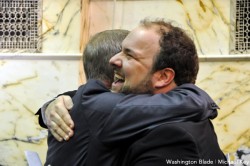
Gay Dels. Peter Murphy and Luke Clippinger embrace following the vote. (Washington Blade photo by Michael Key)
Bill co-sponsor Del. Nathaniel Oaks described a feeling of relief after the bill’s passage, and that sentiment was echoed by almost every other supporter.
“It’s like a big giant weight that’s been lifted, and now we move on,” Del. Mitchell told the Blade, calling the close vote “courageous.” “It’s great to be a part of this history.”
“Tonight can never be taken from us,” Del. Washington told the Blade after the vote.
Voting against the bill was Del. Sam Arora (D-Mont. Co.) who co-sponsored the failed bill of two years ago, and had in 2010 campaigned on a platform that he would support same-sex marriage.
“We feel betrayed,” said progressive activist Karl Frisch, who said that he supported his friend Sam Arora during his election, and said he speaks for many of Arora’s former friends. “This is about family and doing what’s right.”
Frisch told the Blade that a large group of national and local progressive leaders met via conference call Friday night to discuss replacing Del. Arora in his district with another Democrat.
“But it’s nothing personal, in the same way that Sam would claim it’s nothing personal, it’s just his faith,” Frisch said, telling the Blade that Arora took money from those he promised to support marriage equality. “It’s not personal, it’s just our lives. At the end of the day, I wonder how Sam squares his faith with lying and fraud.”
“I have a friend who bought a house in Maryland — not far from his district — and they regret not buying the house in his district so they would be able to vote against him in the next election,” Frisch said. “I hope he has trouble sleeping at night with the shame on his conscience.”
Another damper on last night’s celebrations was the looming prospect of referendum.
“We know there’s people probably out there right now with their petitions gathering signatures,” said Lisa Polyak, chair of the Equality Maryland board of directors. “We have a strategy that we’ve already been working on for months now about how we’re going to 50 plus 1, but we’ll worry about that tomorrow. Tonight we’re going to celebrate.”
Supporters jubilant, eyes on referendum
On the subject of a referendum threat, Clippinger said he is confident that same-sex couples in Maryland will see victory there too.
“We are going to win. The only people that are going to keep us from winning are those who doubt that we can.”
“Today, the House of Delegates voted for human dignity,” Gov. Martin O’Malley said in a statement. “Speaker Busch and his fellow delegates deserve a lot of credit for their hard work. At its heart, their vote was a vote for Maryland’s children.”
He continued, “There is still work to be done and marriage equality has not yet been achieved in Maryland. Wherever we happen to stand on the marriage equality issue, we can agree that all our children deserve the opportunity to live in a loving, caring, committed, and stable home, protected equally under the law.”
“We could not be more grateful to the delegates who today voted to make all Maryland families stronger,” said Joe Solmonese, president of the Human Rights Campaign. “Today, we took a giant step toward marriage equality becoming law – and we are in this position due to the unwavering leadership and resolve of Governor O’Malley, Speaker Busch and our legislative allies.”
Dana Beyer, Gender Rights Maryland executive director, cheered the victory for gay and lesbian Marylanders, telling the Blade she felt “joy.”
“It changes the culture,” Beyer told the Blade. “That’s probably the most important thing. Now we have to do the heavy lifting and deal with the referendum, and that’s why I’m here to do that, and hopefully to get the gender identity bill through, now that this is off the table, so that we can have a duopoly this year.”
Maryland
Md. Commission on LGBTQIA+ Affairs released updated student recommendations
LGBTQ students report higher rates of bullying, suicide

The Maryland Commission on LGBTQIA+ Affairs has released updated recommendations on how the state’s schools can support LGBTQ students.
The updated 16-page document outlines eight “actionable recommendations” for Maryland schools, supplemented with data and links to additional resources. The recommendations are:
- Developing and passing a uniform statewide and comprehensive policy aimed at protecting “transgender, nonbinary, and gender expansive students” against discrimination. The recommendation lists minimum requirements for the policy to address: name, pronoun usage, and restroom access.
- Requiring all educators to receive training about the specific needs of LGBTQ students, by trained facilitators. The training’s “core competencies” include instruction on terminology, data, and support for students.
- Implementing LGBTQ-inclusive curricula and preventing book bans. The report highlights a “comprehensive sexual education curriculum” as specifically important in the overall education curriculum. It also states the curriculum will “provide all students with life-saving information about how to protect themselves and others in sexual and romantic situations.”
- Establishing Gender Sexuality Alliances “at all schools and in all grade levels.” This recommendation includes measures on how to adequately establish effective GSAs, such as campaign advertising, and official state resources that outline how to establish and maintain a GSA.
- Providing resources to students’ family members and supporters. This recommendation proposes partnering with local education agencies to provide “culturally responsive, LGBTQIA+ affirming family engagement initiatives.”
- Collecting statewide data on LGBTQ youth. The data on Maryland’s LGBTQ youth population is sparse and non-exhaustive, and this recommendation seeks to collect information to inform policy and programming across the state for LGBTQ youth.
- Hiring a full-time team at the Maryland Department of Education that focuses on LGBTQ student achievement. These employees would have specific duties that include “advising on local and state, and federal policy” as well as developing the LGBTQ curriculum, and organizing the data and family resources.
- Promoting and ensuring awareness of the 2024 guidelines to support LGBTQ students.
The commission has 21 members, with elections every year, and open volunteer positions. It was created in 2021 and amended in 2023 to add more members.
The Governor’s Office of Communication says the commission’s goal is “to serve LGBTQIA+ Marylanders by galvanizing community voices, researching and addressing challenges, and advocating for policies to advance equity and inclusion.”
The commission is tasked with coming up with yearly recommendations. This year’s aim “to ensure that every child can learn in a safe, inclusive, and supportive environment.”
The Human Rights Campaign’s most recent report on LGBTQ youth revealed that 46.1 percent of LGBTQ youth felt unsafe in some school settings. Those numbers are higher for transgender students, with 54.9 percent of them saying they feel unsafe in school.
Maryland’s High School Youth Risk Behavior Survey reveals a disparity in mental health issues and concerns among students who identify as LGBTQ, compared to those who are heterosexual. LGBTQ students report higher rates of bullying, feelings of hopelessness, and suicidal thoughts. Nearly 36 percent of LGBTQ students report they have a suicide plan, and 26.7 percent of respondents say they have attempted to die by suicide.
The commission’s recommendations seek to combat the mental health crisis among the state’s LGBTQ students. They are also a call for local and state governments to work towards implementing them.
Virginia
Va. lawmakers consider partial restoration of Ryan White funds
State Department of Health in 2025 cut $20 million from Part B program

The Virginia General Assembly is considering the partial restoration of HIV funding that the state’s Department of Health cut last year.
The Department of Health in 2025 cut $20 million — or 67 percent of total funding — from the Ryan White Part B program.
The funding cuts started with the Trump-Vance administration passing budget cuts to federal HIV screening and protection programs. Rebate issues between the Virginia Department of Health and the company that provides HIV medications began.
Advocates say the funding cuts have disproportionately impacted lower-income people.
The Ryan White HIV/AIDS Program, a federal program started in 1990, provides medical services, public education, and essential services. Part B offers 21 services, seven of which remained funded after the budget cuts.
Equality Virginia notes “in 2025, a 67 percent reduction severely destabilized HIV services across the commonwealth.”
Virginia lawmakers have approved two bills — House Bill 30 and Senate Bill 30 — that would partially restore the funding. The Ryan White cuts remain a concern among community members.
Both chambers of the General Assembly must review their proposed changes before lawmakers can adopt the bills.
“While these amendments aren’t a full restoration of what community-based organizations lost, this marks a critical step toward stabilizing care for thousands of Virginians living with HIV,” said Equality Virginia Executive Director Narissa Rahaman. “Equality Virginia plans to continue their contact with lawmakers and delegates through the conference and up until the passing of the budget.”
“We appreciate lawmakers from both sides of the aisle who recognized the urgency of this moment and will work to ensure funding remains in the final version signed by the governor,” added Rahaman.
District of Columbia
D.C. Black Pride theme, performers announced at ‘Speakeasy’
Durand Bernarr to headline 2026 programming

The Center for Black Equity held its 2026 DC Black Pride Theme Reveal event at Union Stage on Monday. The evening, a “Speakeasy Happy Hour,” was hosted by Anthony Oakes and featured performances by Lolita Leopard and Keith Angelo. The Center for Black Equity organizes DC Black Pride.
Kenya Hutton, Center for Black Equity president and CEO, spoke following the performances by Leopard and Angelo. Hutton announced this year’s theme for DC Black Pride: “New Black Renaissance.”
Performers for 2026 DC Black Pride were announced to be Bang Garcon, Be Steadwell, Jay Columbus, Bennu Byrd, Rue Pratt and Akeem Woods.
Singer-songwriter Durand Bernarr was announced as the headliner for the 2026 festivities. Bernerr gave brief remarks through a video played on the screen at the stage.
DC Black Pride is scheduled for May 22-25. For more information on DC Black Pride, visit dcblackpride.org.

